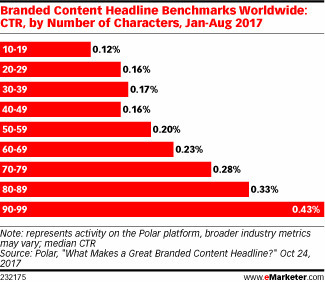It turns out longer is better—at least when it comes to writing headlines for branded content.
Branded content technology provider Polar analyzed a bunch of data provided by premium publishers, such as Oath and Gannett, to see how variation in headlines affected key performance indicators (KPIs).
It found that branded content headlines between 90 and 99 characters achieved a clickthrough rate (CTR) of 0.43%, higher than headlines with fewer characters.
The “more is better” theory also held true for the number of words included in a headline. Polar reported that headlines with 16 words garnered a CTR of 0.33%. By comparison, pithy headlines of just four words recorded an average CTR of less than half that, at just 0.14%.
Some other tips Polar gleaned from its work? Numbers and special characters also resulted in a bump in CTRs. So feel free to figure out how to squeeze an ampersand in there....
Via Jeff Domansky



 Your new post is loading...
Your new post is loading...


















A paradox? More characters and more words mean more clicks.